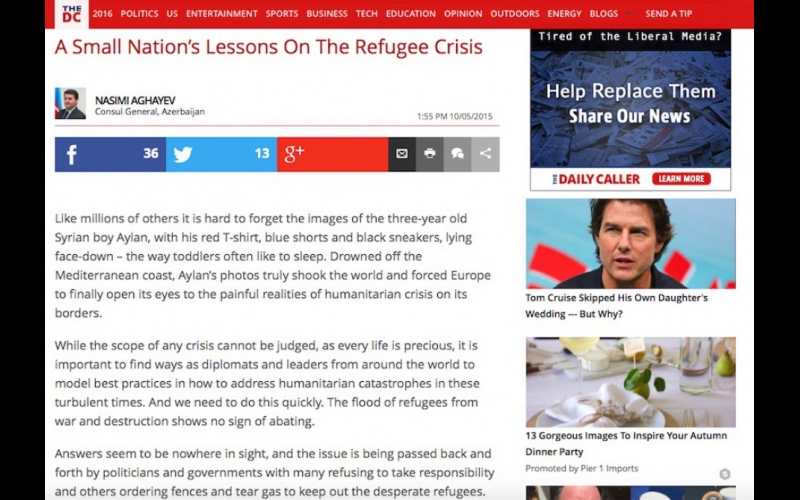
The article reads: “Like millions of others it is hard to forget the images of the three-year old Syrian boy Aylan, with his red T-shirt, blue shorts and black sneakers, lying face-down – the way toddlers often like to sleep. Drowned off the Mediterranean coast, Aylan's photos truly shook the world and forced Europe to finally open its eyes to the painful realities of humanitarian crisis on its borders.
While the scope of any crisis cannot be judged, as every life is precious, it is important to find ways as diplomats and leaders from around the world to model best practices in how to address humanitarian catastrophes in these turbulent times. And we need to do this quickly. The flood of refugees from war and destruction shows no sign of abating.
Answers seem to be nowhere in sight, and the issue is being passed back and forth by politicians and governments with many refusing to take responsibility and others ordering fences and tear gas to keep out the desperate refugees. At a time like this, we need compassion above everything else, not barriers or blame. And perhaps looking at how one small secular Muslim country navigated similar treacherous times not so long ago may offer insight into a path forward for Europe.
My country Azerbaijan is very familiar with the tragedy and challenge of refugees fleeing from conflict. The illegal military invasion and ethnic cleansing of Azerbaijan's lands by Armenia in the early 1990s led to over one million Azerbaijanis being forced to flee their homes and lands, where they had lived in peace for centuries. This was almost 15% of Azerbaijan's population at the time.
In addition to all external Azerbaijani refugees (expelled from Armenia) and internal refugees (IDPs from occupied lands), Azerbaijan also sheltered around 50,000 Ahiska Turks from Central Asia.
At the time, Azerbaijan was struggling with war, economic collapse and the political turmoil of independence from the Soviet Union while facing the enormous challenges in dealing with the burden of so much suffering.
Humanitarian aid from the international community was welcome but not enough: the internal refugees took shelter in enormous tent camps without electricity, running water, schools, or adequate medical services.
The refugees included hundreds of thousands of children – a whole generation of Azerbaijan's citizens – with their childhoods ruined, dreams shattered and opportunities lost. But rather than turn its back, the government, little by little committed to taking care of those most in need. First came improved housing and food, greater coordination with the international aid organizations, then as the country's fortunes improved, so did those of the hundreds of thousands left behind. This collaboration, this spirit, is what we as a global community must find at this critical time. A spirit of compassion and acceptance.
Things have come a long way since the trauma of the 1990s. The last tent camp in Azerbaijan was closed in 2007, and spending billions of dollars, the government has built temporary housing with all necessary utilities, along with schools, hospitals and other services so that everyone can have the standard of living they deserve. All refugees from Armenia and Central Asia were granted Azerbaijani citizenship, which enabled them the same rights as all other citizens of the country.
The last and most important piece in this global debate is the need to resolve these conflicts in order to save lives and preempt humanitarian tragedies. As is the case in my country, where refugees still dream of returning to their lands. Most importantly, they have not abandoned their hope – hope for durable peace, hope for their future and the future of their children in their own homes and lands.
The lesson, which Azerbaijan learnt in coping with its refugee crisis, has been quite simple: no matter the size of the burden, we must always take it on with compassion and determination. The refugees fleeing from war in the Middle East, like those fleeing from war in Azerbaijan twenty years ago, have lost everything: their homes, their jobs, their dreams of a stable and ordered life. We as a global community must do all that we can to alleviate their suffering.
Lacking resources and experience, our country was still determined to accept those who had been forced to flee, no matter what the cost.
The lesson of Azerbaijan can be an inspiration to the EU as it struggles to come to terms with the crisis: it shows that even when times are hard, we can – and should – still help those less fortunate. Let us hope that the governments of Europe heed this lesson, and work together to help the thousands of refugees arriving on its shores in search of a safer life”. (AZERTAC)
Views: 218
